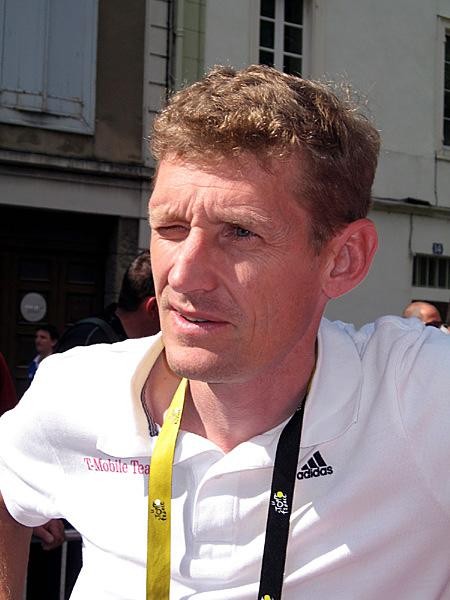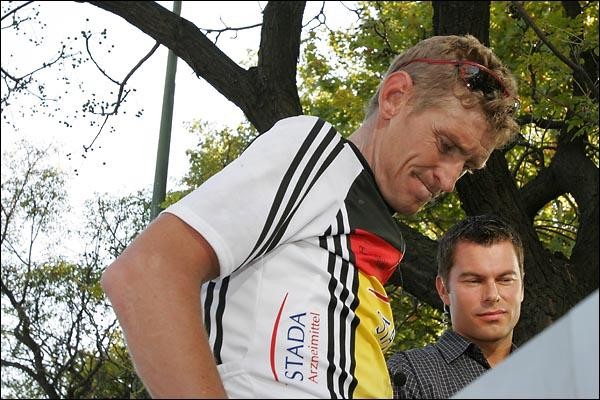Aldag takes on new role at Omega Pharma-QuickStep
Former HTC manager becomes sports and development manager


Next year won’t be the first that Rolf Aldag has worked inside the Omega Pharma-QuickStep team. As technical advisor throughout 2012, Aldag was, among other things, a key figure in parts of Tom Boonen’s build-up to the Classics this spring. It’s a sign of how well that relationship worked that both sides have come back for more.
From an outsider’s point of view, one of the most interesting angles Aldag mentions when discussing his job are the ‘mind games’ that form part of the never-ending technological battles between the different top cycling teams. For example, the cobbled Classics are one of the most important for Omega Pharma and are often seen as the most demanding for bike technology but Aldag says “it’s not just about the equipment, but the psychology behind it, too.”
“If you looked at what we tried to do with Boonen last winter, it’s one thing to put a bike in front of him and say ‘this is your Roubaix bike’. What we have done is include him in the research program. So we had one day with Specialized and SRAM where we tested on the cobbles, on real data with SRMs, going up and down it for about five hours.”
“So Tom was going up and down, changing the wheels, changing the pressure, re-fixing the bike, so you could see what was needed for him to go at 45 kilometres an hour. And he understands that, he understands what it needs.”
Omega Pharma–QuickStep also hired the velodrome in Valencia, Spain for more work with Boonen in what Aldag calls “a really easy comparison. First he used the same wheel he used in Paris-Roubaix, aluminium rims and 32 spokes and we had him riding at 50kph there on the indoor track, measuring the wattage we need. Then you put him on the best possible new setup and he can see the difference.”
“Then you put him back on the old set up, he hardly makes 50kph and you’ve won him psychologically, he sees the benefits and the advantages that others might not have.”
“When I watched him on TV in Paris-Roubaix, the position of his arms for example on the handlebars, it was very interesting because you know – we tried out all that stuff.”
Get The Leadout Newsletter
The latest race content, interviews, features, reviews and expert buying guides, direct to your inbox!
“When you’ve know you got a whole team chasing you” – or at least, four riders from Sky at the same time when Boonen started his lone attack – “but you know the best possible outcome for him and you see that he [Boonen], remembers what we did, he does all the right things we talked about, then it’s clearly had a huge benefit.”
For Aldag, though, that’s only part of the jigsaw: “It’s about equipment, a commitment from the sponsors and implementation of all that in the team. But even if you’ve got the fastest bike on paper, you’ve got to have the fastest rider on it and the most efficient position.”
“We’ve done that with Tony Martin, he’s been so many times in the wind tunnel, but Omega Pharma-QuickStep has also become the world team time trial champions. A few years ago, who would have thought that was possible? But it happened.”
Last year Aldag was working for a lot of the time in triathlon as well. Next season , however, he will be 100 percent focused on his new position as Sport and Development manager with Omega-Pharma-QuickStep, his role in the team will diversify and he will become a more permanent part of the organigram.
“I was there at Paris-Roubaix, Paris-Flanders, testing and training camps and at the Tour de France,” Aldag told Cyclingnews, “and I was part of the team working last spring with Tom [Boonen] too in a technical area, too.”
“So it’s a mistake to say, as some people have written, that I’ve come back to cycling. I’ve never been away.”
The former pro and HTC manager is more than enthusiastic, in any case, about his new role in the Omega Pharma-Quick Step team.
“From the team point of view, their aim is to increase their resources. From mine, it started when I sat down with team management, we discussed what had gone well in my role as technical advisor and what we could improve in the team if we expanded it and we took it from there, creating this new position.”
Aldag is at pains to point out that he won’t simply be operating in R&D.
“These days team managers have a lot of work to do securing a team’s financial future and [at Omega Pharma-Quick Step] that’s obviously Patrick Lefevre’s role. I’m more focused on technology and matching that with training and racing schedules, fitting together all the pieces and working with the sports directors, too. It’s a role I’m happy with, it’s about earning the team’s trust and using all those opportunities I’ve got.”
Cavendish
As for working again with Mark Cavendish, as he did for so many years at HTC, Aldag says that the sprinter is a very acute and knowledgeable observer when it comes to getting the best out of his bike.
“Mark is definitely interested in technology, and he has strong opinions about it. He would not always accept data at face value, saying [for example] ‘that’s ok, but I can’t breathe like that’. He will always argue his case.”
“He’s good at feedback and you’d see that things are to his benefit, he’ll do it, like he was one of the first guys to wear a covered helmet at the World Championships in 2011. He was wearing a TT suit, too. He’s not just the kind of guy to say ‘give me shorts and a jersey and I’ll do it.’”
“But he also doesn’t overdo it, either, he won’t ask you every tiny detail. It’s the same as Tony Martin, he can’t really tell you what rolling resistance his tyres are at. But he assumes they are the fastest and Cavendish is the same.”
“He knows he can’t do it [the technological side] all on his own, it’s more like he thinks ‘I expect experts around me to take care of it, but yes, I’m very interested in it.’ So yes, he pushes hard for it.” And from 2013 at Omega Pharma-QuickStep, Aldag will be one of those providing the answers.
Alasdair Fotheringham has been reporting on cycling since 1991. He has covered every Tour de France since 1992 bar one, as well as numerous other bike races of all shapes and sizes, ranging from the Olympic Games in 2008 to the now sadly defunct Subida a Urkiola hill climb in Spain. As well as working for Cyclingnews, he has also written for The Independent, The Guardian, ProCycling, The Express and Reuters.
